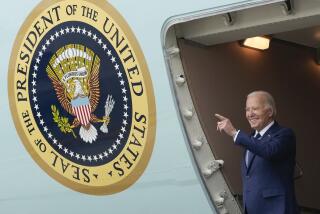GOP, Beware King Caucus
- Share via
Democrats in the House saw disaster looming for their 1984 presidential nominee. But even more than the grim vision of their party’s standard-bearer being buried in a second-term Reagan landslide was their fear of losing their own seats. They reasoned that a disastrously weak candidate at the head of the ticket would cost them their modest 1982 gains, which seemed to mark their recovery from Jimmy Carter’s defeat. To avert this catastrophe, they decided to become kingmakers and influence the choice of nominees. Now, in a remarkable example of emulating the precepts of the enemy, House GOP leaders are putting their muscle behind what they hope will be a nomination by acclamation of Texas Gov. George W. Bush.
For the Democrats in 1984 there was an intriguing precedent. Between 1800 and 1828, Thomas Jefferson’s Democratic-Republican Party made their decision behind closed doors. Only elected members of Congress from the party participated. In those days, before the brisk winds of Jacksonian democracy ventilated the institutions of American government, it was considered legitimate for the elite to call the shots.
But the congressional Democrats of the mid-1980s were not so presumptuous to think that they could dictate their choice to the electorate. They merely requested the hopefuls to come to the party caucus, make a presentation and take a few questions. Fearing to be labeled “King Caucus,” the term derisively applied by Andrew Jackson to a process dominated by party notables, the modern Democrats shied away from anything with the appearance of an official endorsement.
Members of Congress of both parties have a considerable stake in a nominee who can appeal to a broad spectrum of voters in a general election. Fearing being pulled down by a foundering presidential candidate, choose a mainstream candidate with They also are apprehensive that strongly motivated voters from the more extreme wings of their parties who wield disproportionate influence in primary elections might choose one of their own. For Democrats, the nightmare campaign McGovern’s in 1972. For the Republicans, it was Barry Goldwater in 1964.
Like the Democrats in 1984 who had no fewer then seven presidential hopefuls, the GOP in 2000 boast 10. The very breadth of choice raises the fear of a fragmented electorate in which an ideologue, say Pat Buchanan, ends up with the largest number of convention delegates and runs the party into an iceberg.
Even elected officials who might seem to rejoice at the prospect of a deep-dyed doctrinaire nominee would prefer the pleasures of incumbency than console themselves with going down to defeat with a pure but hapless standard-bearer.
Accordingly, some of the most conspicuous rightists in the House such as Majority Leader Dick Armey and Majority Whip Tom DeLay have been rallying under the big tent of fellow Texan Bush.
What distinguishes the House Republicans’ push for consensus in 1999 and the 1984 congressional Democrats’ quest is that the Democrats did not presume to dictate to the primary electorate.Congressional Republicans and their allies seem intent on creating a kind of regency with Bush as their heir-apparent.
This is a risky undertaking. In a party characterized by hostility to Washington and wariness of anything resembling centralization of power, the mass embrace by party notables of Bush and his hazy, oracular stands on issues may strike many grass-roots Republicans as a scheme by party elites to cut them out of the action.
Republican leaders need to resist the temptation fora premature coronation. They need only look at the struggles of Al Gore to see the dangers of attempting to enthrone too hastily. Sometimes the strategy works, but at others voters delight in proving the big guys wrong.
More to Read
Get the L.A. Times Politics newsletter
Deeply reported insights into legislation, politics and policy from Sacramento, Washington and beyond. In your inbox twice per week.
You may occasionally receive promotional content from the Los Angeles Times.










